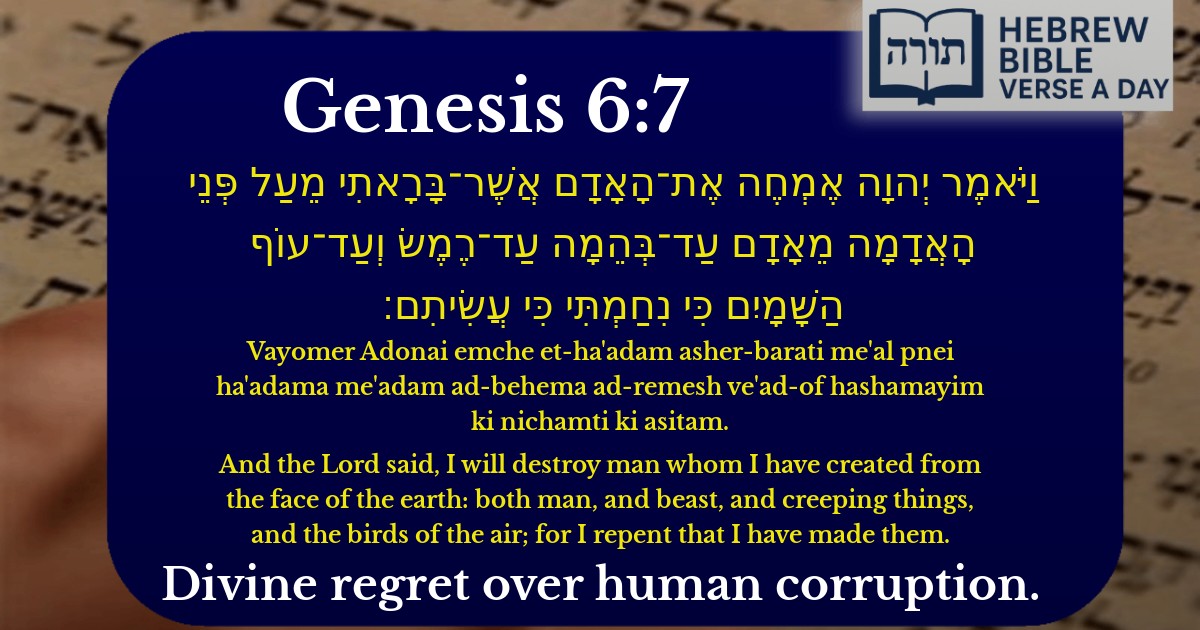Join Our Newsletter To Be Informed When New Videos Are Posted
Join the thousands of fellow Studends who rely on our videos to learn how to read the bible in Hebrew for free!
Hebrew Text
וַיֹּאמֶר יְהוָה אֶמְחֶה אֶת־הָאָדָם אֲשֶׁר־בָּרָאתִי מֵעַל פְּנֵי הָאֲדָמָה מֵאָדָם עַד־בְּהֵמָה עַד־רֶמֶשׂ וְעַד־עוֹף הַשָּׁמָיִם כִּי נִחַמְתִּי כִּי עֲשִׂיתִם׃
English Translation
And the Lord said, I will destroy man whom I have created from the face of the earth: both man, and beast, and creeping things, and the birds of the air; for I repent that I have made them.
Transliteration
Vayomer Adonai emche et-ha'adam asher-barati me'al pnei ha'adama me'adam ad-behema ad-remesh ve'ad-of hashamayim ki nichamti ki asitam.
Hebrew Leining Text
וַיֹּ֣אמֶר יְהֹוָ֗ה אֶמְחֶ֨ה אֶת־הָאָדָ֤ם אֲשֶׁר־בָּרָ֙אתִי֙ מֵעַל֙ פְּנֵ֣י הָֽאֲדָמָ֔ה מֵֽאָדָם֙ עַד־בְּהֵמָ֔ה עַד־רֶ֖מֶשׂ וְעַד־ע֣וֹף הַשָּׁמָ֑יִם כִּ֥י נִחַ֖מְתִּי כִּ֥י עֲשִׂיתִֽם׃
וַיֹּ֣אמֶר יְהֹוָ֗ה אֶמְחֶ֨ה אֶת־הָאָדָ֤ם אֲשֶׁר־בָּרָ֙אתִי֙ מֵעַל֙ פְּנֵ֣י הָֽאֲדָמָ֔ה מֵֽאָדָם֙ עַד־בְּהֵמָ֔ה עַד־רֶ֖מֶשׂ וְעַד־ע֣וֹף הַשָּׁמָ֑יִם כִּ֥י נִחַ֖מְתִּי כִּ֥י עֲשִׂיתִֽם׃
🎵 Listen to leining
Parasha Commentary
📚 Talmud Citations
This verse is quoted in the Talmud.
📖 Sanhedrin 108a
The verse is discussed in the context of the generation of the Flood, where God's decision to destroy all living creatures is examined in relation to human wickedness.
📖 Berakhot 61a
The verse is referenced in a discussion about the creation of humanity and the consequences of human actions, highlighting God's regret over creating humans due to their evil deeds.


Divine Judgment and the Flood
The verse (Bereishit 6:7) describes Hashem's decision to bring the Mabul (Flood) as a response to humanity's corruption. Rashi explains that the phrase "כי נחמתי כי עשיתם" ("for I repent that I have made them") does not imply regret in the human sense, as Hashem is unchanging. Rather, it signifies a shift in divine providence—from mercy to strict justice—due to mankind's wickedness (Rashi on Bereishit 6:6).
Inclusion of Animals in the Judgment
The destruction extends to animals ("מֵאָדָם עַד־בְּהֵמָה... עוֹף הַשָּׁמָיִם"), which the Midrash (Bereishit Rabbah 28:8) interprets as a consequence of their corruption alongside humans. Ramban (Nachmanides) adds that animals were created for humanity's benefit; thus, their fate was tied to mankind's moral state (Ramban on Bereishit 6:7).
Theological Implications of "נחמתי" (I Repent)
Contrast with Noach's Righteousness
The Talmud (Sanhedrin 108a) notes that the decree spared Noach because he maintained moral integrity amidst universal corruption. This highlights the principle of צדיק יסוד עולם ("the righteous are the foundation of the world"), ensuring continuity of creation even in judgment.